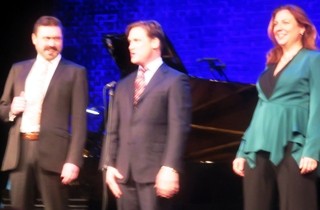|
Back
Paeans and Pains To Fauna and Felons New York
Sheen Arts Center
03/13/2018 -
“Of Beasts and Brutes”
“Older Beasts”
Béla Bartók: For Children, Sz. 43 (Vol. 2): 39. “The cricket marries”
Josquin des Prez: The Cricket
Camille Saint-Saëns: The Grasshopper and the Ant
André Caplet: The Grasshopper and the Ant
Maurice Ravel: Natural Histories: “The Kingfisher” – “The Guinea Hen”
Zóltán Kodály: Youth is like a falcon – My Geese, My Geese
Joaquín Rodrigo: Song of the Cuckoo; “Older Brutes”
George Frideric Handel: Julius Ceasar, HWV 17: “I was born to weep”
Arnold Schoenberg: Ode to Napoleon, Opus 41 (excerpt)
William Walton: Façade: “Said King Pompey”
Scott Wheeler: Et tu, Brute Fanfare (Premiere)
“Newer Beasts”
Richard Pearson Thomas: A Nash Menagerie: “The Duck” – “The Pigeon” – “The Rooster”
Francine Trester: An Oman Odyssey (Premiere): “American Kestrel” – “Ringtail Cat” – “Wolf Head”
“Newer Brutes”
Dmitri Shostakovich: From Jewish Folk Poetry, Opus 79: 2. “Fussy Mummy and Auntie”
Christopher Berg: Song of the Dark Doves (Premiere)
Federico García Lorca: Canciones populares: “The Moorish Girls from Jaén” – “Go On, Have A Brawl”
Hanns Eisler: Hollywood Songbook: “To The Transistor Radio” – “On Suicide”
“Birds in Ukraine”
Pyotr Ilyich Tchaikovsky: 12 Romances, Opus 60: 4. “The Nightingale” – 16 Songs for Children, Opus 54: 8. “The Cuckoo”
Mikhail Glinka: The Skylark
Vira Slywotzky (Soprano), Scott Murphree (Tenor), Mischa Bouvier (Baritone)
Margaret Kampmeier (Piano), Richard Lalli (Curator)

M. Bouvier, V. Slywotzky, M. Kampmeier (© Samuel A.Dog)
“Argos, his dog, saw Odysseus from a distance, as he lay in the dirt, covered with filth. Now, as he perceived Odysseus coming closer to him, he wagged his tail and laid both his ears back. Yet he no longer had the strength to move any closer to his master, who secretly wiped a tear away.”
From Homer’s The Odyssey, Book 17
Last night’s songfest of mainly metaphorical animals (and predominantly brutal humans) at the Sheen Center started with the well-known “Cricket Song” by Des Prez from around 1500. But one likes to imagine the very first “animal song”, some 8,000 years older.
The image starts with the blind bard Homer reciting the first 16 books of the Odyssey to his aristocratic audience, chanting, intoning, lifting his voice, rocking like Stevie Wonder and giving vent to his emotions. When he starts Chapter 17, Homer relates the meeting of dog and man. Argos has been neglected, but waits patiently for Odysseus over a decade. When he identifies his old friend, even in disguise, Argos lifts his head, wags his tail, tries to move and then expires, the vision of Odysseus in his filmy closing eyes.
As a dog-lover, I cry. And I presume that Homer himself at that point rose from his chair, finished his chanting and unavoidably had to rhapsodize in singing this eternal friendship between man and dog.
True, such a meeting would be Homer’s purely poetic inspiration, since animals before Aristotle were merely mysterious alien creatures. (Or worse, similes.) Only later did they inspire some of the composers who made up this interesting, if not faultless program.
The fault was not musical, since the three singers and one pianist gave their vocal–and dramatic–best to the eclectic songs and scenas. The music was Renaissance and Baroque, Impressionist and dodecaphonic, with a few world premieres as well. The animals included geese, cuckoos and other birds, as well as a kestrel, ringtail cat, coyote and a few insects.
More power to the diversity!
A few caveats, though. First, putting “brutes”–Franco, Stalin, Bonaparte, and Pompey–into the mix was a sad invention. First, because so much can be said for our fauna friends that lumping dictators into the mix is putting Tabasco sauce on caviar.
But secondly, because the “brute songs” were irrelevant to brutality.
Shostakovich did write wicked songs about Stalin, but his “Hebrew melody” had no connection with the Russian dictator. (For real satire, see the movie The Death of Stalin, with brilliant ersatz-Shostakovich music by Christopher Wills.) Pompey might have been rather nasty , but the Edith Sitwell/William Walton Façade section was simply a jingle. Schoenberg’s complete Ode to Napoleon is from Byron’s far from incriminating poem–though singing a short excerpt from this dramatic and most accessible work is criminal in itself.
One revelation came with the songs by Federico García Lorca. I had always assumed Lorca’s “Canciones populares” were composed by Manuel de Falla, but no, these two pieces were written by the poet himself. (And, while Lorca was executed by Franco, nothing was “political” about this poetry.)
In fact, the only “brutal” music came from Eisler’s setting of bitter, biting poems by Bertolt Brecht, where the brute is not human, but Hollywood itself.
Onto the music. A fine short Bartók solo to begin with, the composer’s paean to the cricket. Of course all the Night Music contained cricket sounds, but this piano work was a rare gem. Add to this a Des Prez madrigal, a three-work jaunty, jolly delicious 16th Century work sung by the three soloists of the evening.
They each had their wondrous moments. Vira Slywotzky was the most dramatic soprano, unafraid to prance across the stage, to imitate a cuckoo bird from a sitting position or sing the most luscious Lorca song. She also sung one of the Magyar songs by Kodály, another welcome rarity.
Baritone Mischa Bouvier and tenor Scott Murphree had voices which were equally engaging to tell stories, or to give epigrammatic Ogden Nash poems, composed with delight by Richard Pearson Thomas, who was in the audience.
All three participated in two of Ravel’s Natural History songs, not amongst his better pieces. Perhaps they should have taken his cat-song from L’Enfant et les Sortilèges. More trenchant, funny, onomonopaiec.

F. Trester (© Courtesy of the Artist)
Other premieres were a trio of excerpts from Francine Trester’s An Oman Odyssey (inspired by the pictures of Sheridan Oman). Ms. Trester’s music was sung and composed with a luscious and emotional sense–but it was her poetry which totally enthralled me.
Yes, the “Ringtail Cat” was like an ironic paean to Eliot’s feline Prufrock until the jolting finish when its “sharp claws” make certain you “won’t forget. Remember what I’m not.”. “American Kestrel” cusps on the savagry “primed and ready/Quick to the kill/Silent and steady/Shadow/So still
The third dealing with a coyote in sad search of a mate over the barren plains is so plaintive, such a sign of our un-conserved times. I don’t want to bring myself in, but from my own research on the Borneo orangutan, this lone creature is dying out in a similar way. Not by poachers, but by cutting the forests in the Sabah wilderness, so they can never find a mate.
Her sensitivity, her feelings for a 2018 Bestiary were remarkable.
The finish were three Russian songs, Glinka’s famous Skylark, and two Tchaikovsky songs which were all too rare.
The program was produced by Mirror Visions Ensemble, which explores “the relationship between music and text”, a gallant and aesthetically impossible challenge. Yet always worth trying.
Stravinsky, whose own Cat Lullabies could have been included, once said that his music was best understood by children and animals. One doubts if he was serious, but my own dog might have appreciated the concert. Especially had they included J.S. Bark’s Wachet Arf...or Schoenberg’s equally onomonopaiec Grrrrrr-lieder.
Harry Rolnick
|